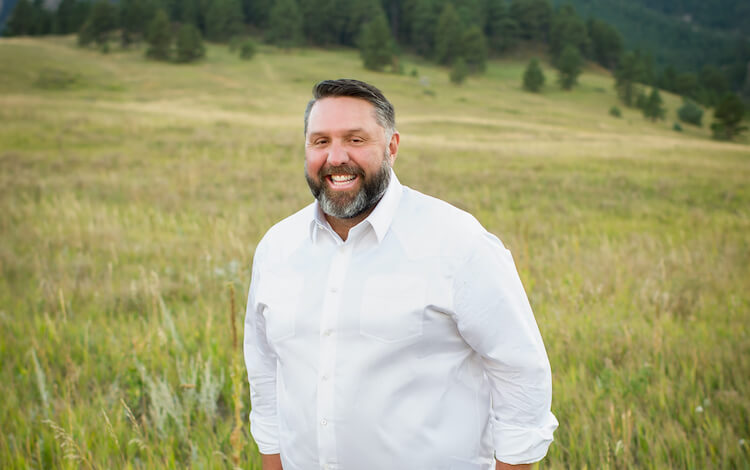Growing up, Chris Riley (MBA 2008) always saw an established way of doing things.
Born and raised in rural Utah, Chris is the son of a fourth generation coal miner. Like many from his background, Chris enlisted in the US Navy straight out of high school. He had a successful career there, ascending the ranks from officer, to navigator, to chief engineer, and finally Captain of a warship.
It was his decision to study at Harvard Business School, however, that showed him things could be done differently, whether this was in his role as captain of the USS Sirocco, or in the clean energy startup that he would set up after he left the Navy.
Now CEO of Guzman Energy, he is leading the disruption of an energy industry in the US which has remained unchanged for decades.
From the Navy to the Harvard MBA
Chris enlisted in the Navy straight out of high school and was at the US Naval Academy for four years. He was then in active duty for just shy of 11 years.
After holding a number of positions on US warships, Chris started to have an inkling that he wanted to try something different to see if he could have an impact elsewhere.
“I wanted to see if I could start a company that had an impact on the world, that drove change in an industry and helped people at the same time,” Chris recalls.
The Navy offered to sponsor recruits to go to business school. Chris applied for just one school, Harvard Business School, and was accepted.
The contrast of environments struck him instantly. From five years in the Navy, he was used to a rigid way of doing things where one wouldn’t question. But at HBS, the diversity of perspectives and personalities created a completely novel learning environment for him.
“It changed my perspective on everything. I was in a room of tremendously smart people of different backgrounds, seeing a new range of perspectives as to how to solve problems.”
It also helped somewhat that he was starting from scratch. Chris was a relative newcomer to many business concepts, and HBS was a chance to build a foundational knowledge of business.
After graduating from Harvard he returned to the Navy for two years as a captain: an opportunity for him to try out his new alternative leadership style.
“HBS freed me from thinking that I had to conform to everyone else. I wanted to apply things I learned at Harvard to things I was doing at the military, and see if I could come up with entirely new ways of doing things and really inspire those I was working with.”
He experimented with novel concepts like a four day working week, which he believes empowered his crew and peers to take initiative. “I tried some really out-of-the-box things that, frankly, worked really well.”
Building a business from scratch

Around 2011, just after he left the Navy, Chris identified an opportunity in the energy industry—that renewable energy was set to boom in popularity, while fossil fuels were decreasing in value. But he had no experience in energy, aside from his family history in coal mining.
He believes his outsider status actually gave him an advantage. “I had the confidence to know that I didn't have to conform to the way every other company was doing things.”
Chris co-founded Guzman Energy in 2013 as a force to disrupt energy provision in the US. He identified that many rural communities were tied into 20-to-50 year contracts with energy companies, which were far higher in cost than expected, and were usually tied to carbon assets like coal mines.
“Through a combination of public, political, and legal pressure, we help these communities to exit these contracts to go to a new provider. We’ll pay breakup fees, on behalf of these communities, to the incumbent, and then we’ll become their new energy provider,” Chris explains.
“We do that at prices dramatically lower than what they were paying, and do it with clean energy.”
Guzman also places a huge emphasis on making sure energy is sourced locally. They do everything they can to use local labor to build local resources, like solar panels, inside their community.
“So as well as getting cheaper and cleaner power, they’re getting job creation inside their own rural community, which in places like these, is very precious.”
The idea quickly took off. One project with an energy cooperative in New Mexico “sent shockwaves around the country”, Chris says, as rural communities realized they could reclaim control of energy provisions which had been unchanged since the early 1900s.
Developing his own leadership style
While he held senior leadership positions in the military, Chris acknowledges that being CEO of a startup is quite different.
There are certainly a few things that benefit him in a commercial setting—”being able to stay focused, keep the organization on task, and work through priorities efficiencity.”
But his Harvard MBA taught him to adopt more of a collaborative leadership approach, in which his role is to get the most out of his team through empowering them. “At Guzman, I’ve assembled a team of spectacular, smart, driven, morally centered people. A lot of what I do is just help give them resources and help them shape their thinking,” he reveals.
While Guzman is now a much bigger player in the energy industry, Chris is still keen to retain the status of a disruptive outsider. “I’ve never had the background to know how it should be done—how it has always been done—so I just do it the way that it makes sense to me, using things I learned at HBS.”
From the military and looking to study on the Harvard MBA? The HBS Armed Forces Alumni Association is hosting a Military Virtual Visit Week on the 9th - 12th November. You can find out more here.
READ MORE: The US Army Veteran Using His Harvard MBA To Do Good




